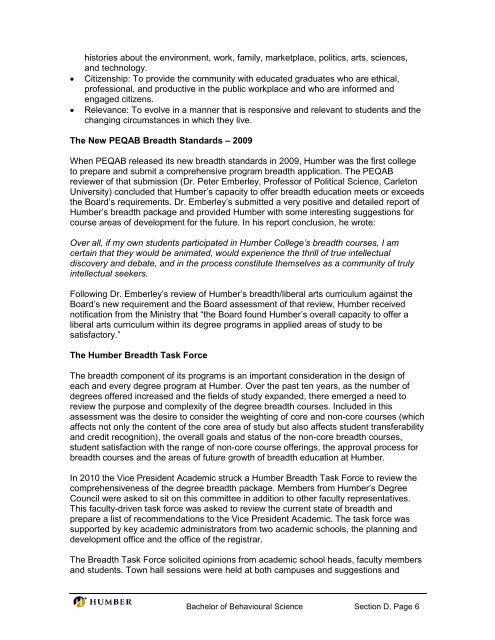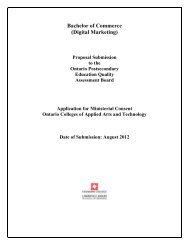Bachelor of Behavioural Science - Postsecondary Education Quality ...
Bachelor of Behavioural Science - Postsecondary Education Quality ...
Bachelor of Behavioural Science - Postsecondary Education Quality ...
You also want an ePaper? Increase the reach of your titles
YUMPU automatically turns print PDFs into web optimized ePapers that Google loves.
histories about the environment, work, family, marketplace, politics, arts, sciences,<br />
and technology.<br />
Citizenship: To provide the community with educated graduates who are ethical,<br />
pr<strong>of</strong>essional, and productive in the public workplace and who are informed and<br />
engaged citizens.<br />
Relevance: To evolve in a manner that is responsive and relevant to students and the<br />
changing circumstances in which they live.<br />
The New PEQAB Breadth Standards – 2009<br />
When PEQAB released its new breadth standards in 2009, Humber was the first college<br />
to prepare and submit a comprehensive program breadth application. The PEQAB<br />
reviewer <strong>of</strong> that submission (Dr. Peter Emberley, Pr<strong>of</strong>essor <strong>of</strong> Political <strong>Science</strong>, Carleton<br />
University) concluded that Humber‘s capacity to <strong>of</strong>fer breadth education meets or exceeds<br />
the Board‘s requirements. Dr. Emberley‘s submitted a very positive and detailed report <strong>of</strong><br />
Humber‘s breadth package and provided Humber with some interesting suggestions for<br />
course areas <strong>of</strong> development for the future. In his report conclusion, he wrote:<br />
Over all, if my own students participated in Humber College’s breadth courses, I am<br />
certain that they would be animated, would experience the thrill <strong>of</strong> true intellectual<br />
discovery and debate, and in the process constitute themselves as a community <strong>of</strong> truly<br />
intellectual seekers.<br />
Following Dr. Emberley‘s review <strong>of</strong> Humber‘s breadth/liberal arts curriculum against the<br />
Board‘s new requirement and the Board assessment <strong>of</strong> that review, Humber received<br />
notification from the Ministry that ―the Board found Humber‘s overall capacity to <strong>of</strong>fer a<br />
liberal arts curriculum within its degree programs in applied areas <strong>of</strong> study to be<br />
satisfactory.‖<br />
The Humber Breadth Task Force<br />
The breadth component <strong>of</strong> its programs is an important consideration in the design <strong>of</strong><br />
each and every degree program at Humber. Over the past ten years, as the number <strong>of</strong><br />
degrees <strong>of</strong>fered increased and the fields <strong>of</strong> study expanded, there emerged a need to<br />
review the purpose and complexity <strong>of</strong> the degree breadth courses. Included in this<br />
assessment was the desire to consider the weighting <strong>of</strong> core and non-core courses (which<br />
affects not only the content <strong>of</strong> the core area <strong>of</strong> study but also affects student transferability<br />
and credit recognition), the overall goals and status <strong>of</strong> the non-core breadth courses,<br />
student satisfaction with the range <strong>of</strong> non-core course <strong>of</strong>ferings, the approval process for<br />
breadth courses and the areas <strong>of</strong> future growth <strong>of</strong> breadth education at Humber.<br />
In 2010 the Vice President Academic struck a Humber Breadth Task Force to review the<br />
comprehensiveness <strong>of</strong> the degree breadth package. Members from Humber‘s Degree<br />
Council were asked to sit on this committee in addition to other faculty representatives.<br />
This faculty-driven task force was asked to review the current state <strong>of</strong> breadth and<br />
prepare a list <strong>of</strong> recommendations to the Vice President Academic. The task force was<br />
supported by key academic administrators from two academic schools, the planning and<br />
development <strong>of</strong>fice and the <strong>of</strong>fice <strong>of</strong> the registrar.<br />
The Breadth Task Force solicited opinions from academic school heads, faculty members<br />
and students. Town hall sessions were held at both campuses and suggestions and<br />
<strong>Bachelor</strong> <strong>of</strong> <strong>Behavioural</strong> <strong>Science</strong> Section D, Page 6
















